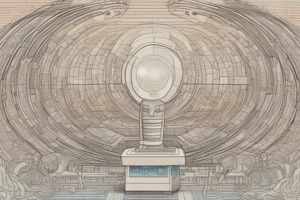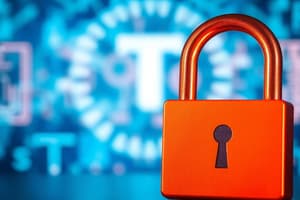Podcast
Questions and Answers
What is the main concern of ethicists working in fields of applied ethics?
What is the main concern of ethicists working in fields of applied ethics?
- Studying traditional ethical issues
- Developing new ethical theories
- Debating ethical theories
- Applying ethical theories to analyze moral problems (correct)
What is the term used to describe the gaps in laws and policies resulting from technological advancements?
What is the term used to describe the gaps in laws and policies resulting from technological advancements?
- Policy vacuums (correct)
- Ethical voids
- Logical malleability
- Conceptual muddles
Why do some policy vacuums require clarification before new policies can be formulated?
Why do some policy vacuums require clarification before new policies can be formulated?
- Because of conflicting ethical theories
- Because of conceptual muddles (correct)
- Because of the rapid advancement of technology
- Because of lack of public awareness
What is the term used to describe the ability of computers to be molded in ways that allow for many different kinds of uses?
What is the term used to describe the ability of computers to be molded in ways that allow for many different kinds of uses?
What is the primary distinction made by Moor (2000) in analyzing the issues involved in this debate?
What is the primary distinction made by Moor (2000) in analyzing the issues involved in this debate?
What is the main concern of traditionalists in the debate?
What is the main concern of traditionalists in the debate?
What is the example given in the text to illustrate a policy vacuum?
What is the example given in the text to illustrate a policy vacuum?
What are the three distinct perspectives of applied ethics mentioned in the text?
What are the three distinct perspectives of applied ethics mentioned in the text?
What is the main issue of debate in the context of cyberethics?
What is the main issue of debate in the context of cyberethics?
What is the main argument of Traditionalists regarding cyberethics?
What is the main argument of Traditionalists regarding cyberethics?
What is an example of the impact of scale in cyberethics?
What is an example of the impact of scale in cyberethics?
What is a criticism of the Uniqueness Proponents' argument?
What is a criticism of the Uniqueness Proponents' argument?
What is an example of a unique feature of computer technology?
What is an example of a unique feature of computer technology?
What is the logical fallacy in the Uniqueness Proponents' argument?
What is the logical fallacy in the Uniqueness Proponents' argument?
What is a consequence of the impact of scope in cyberethics?
What is a consequence of the impact of scope in cyberethics?
What is the conclusion of the debate between Traditionalists and Uniqueness Proponents?
What is the conclusion of the debate between Traditionalists and Uniqueness Proponents?
Flashcards are hidden until you start studying
Study Notes
Cyberethics Issues: Uniqueness Debate
- The debate revolves around whether cybertechnology has generated new or unique ethical issues, with traditionalists and uniqueness proponents holding different views.
Traditionalist View
- Traditionalists argue that nothing is new – crime is crime, and murder is murder, implying that cyberethics issues are not unique.
- They underestimate the role of scale and scope in cyberethics issues, which can have a significant impact on the severity and reach of the issue.
Uniqueness Proponent View
- Uniqueness proponents argue that cybertechnology has introduced new and unique ethical issues that could not have existed before computers.
- They tend to overstate the effect of cybertechnology on ethics, confusing unique features of computer technology with unique ethical issues.
Critique of the Uniqueness Thesis
- The argument is based on a logical fallacy: premise 1: cybertechnology has unique technological features, premise 2: cybertechnology generates some ethical issues, conclusion: (at least some of the) ethical issues generated by cybertechnology must be unique.
Moor's Argument
- Moor (2000) argues that computer technology generates “new possibilities for human action” because computers are logically malleable.
- Logical malleability in computers means that they can be molded in ways that allow for many different kinds of uses, leading to policy vacuums.
Policy Vacuums
- Policy vacuums are “voids” or gaps in our laws and policies.
- Some policy vacuums cannot easily be filled because of conceptual muddles, requiring elucidation before clear policies can be formulated and justified.
Applied Ethics
- Applied ethics examines "practical" ethical issues, analyzing moral issues from the vantage-point of one or more ethical theories.
- Three distinct perspectives of applied ethics in cyberethics: Professional Ethics, Philosophical Ethics, and Sociological/Descriptive Ethics.
Studying That Suits You
Use AI to generate personalized quizzes and flashcards to suit your learning preferences.




